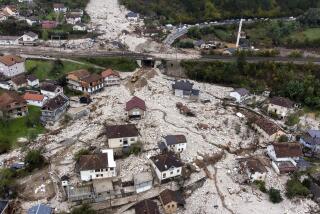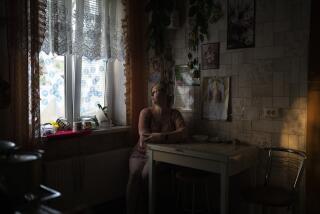Grim Reality Confronts Returnees
- Share via
UROSEVAC, Yugoslavia — Kosovo refugees began to trickle back to their devastated nation Sunday, but the homecoming was almost exclusively the province of men.
Men such as Sali Vila, 45, and his cousin, Nexhat, who, one day after NATO troops rolled in, came home to the ghost town of Hani.i.Elezit to find their homes ransacked, looted and sprayed with the tick-tack-toe-like symbol of Serbian unity.
Theirs was a homecoming likely to be repeated tens of thousands of times when the rest of the refugees forced to flee the province follow in their footsteps. Virtually every village along the first 30 miles of the main two-lane artery from the Blace border crossing in Macedonia to Urosevac, where U.S. forces set up camp Sunday, is deserted. Windows are blown out. Walls are riddled with bullet holes. Cars are stripped. Several homes are burned, with only the exterior walls left standing.
At dusk, the surroundings are particularly spooky: The emptiness and absence of any electricity in the villages give the stunning pastoral countryside an eerie silence, punctuated only by the thundering roar of tanks that roll nearby every few minutes and the helicopters flying overhead like giant mosquitoes.
The extensive damage appears to corroborate refugees’ tales of terror at the hands of Serbs, who many say ordered them at gunpoint to leave their homes. They fled by the tens of thousands to Macedonia and Albania, staying with relatives or in refugee camps.
The pioneers who traveled back Sunday couldn’t wait to see for themselves what, if anything, had been spared. The answer turned out to be: very little.
The Blace border crossing was not very busy with travelers other than journalists and soldiers aboard hundreds of military vehicles. At most, a few hundred civilians crossed the border, and the U.S. soldiers there weren’t asking if the returnees were refugees.
But along the road, it was clear that the pedestrians were refugees. They waved to the tanks and armored vehicles that rolled by. The first thing nearly all said when meeting an American reporter and photographer was “Thank you--tell the American people, thank you.”
One refugee kissed both cheeks of Staff Sgt. Dan Borden, the first soldier he met as he crossed through the border post taken over by the U.S. Army on Sunday.
At 6 p.m., nine refugees were still walking. They’d left the refugee camp just over the border in Macedonia and had walked nearly 25 miles, with several still to go. Three took shoes off aching feet to walk barefoot or in socks.
The men had opted to make the journey homeward Sunday, rather than waiting, as aid workers had advised, because “we want to feel our freedom--we didn’t want to leave our homeland, but we had to,” said Hajdar Dili, 21.
The Vilas didn’t tell their wives that they were returning to their homes, nor did they want the women along. This was man’s work: They wanted to scope out the damage and danger firsthand and make sure it was safe to return. The cost of the opportunity was high: They knew they would probably not be able to obtain visas to return to the safety of Macedonia again.
What they found was beyond their worst nightmares.
Sali Vila’s house looked as though a hurricane had roared through. Clothes, suitcases, food, dresser drawers, everything was piled up a foot deep on the floor. The Serbian “4-C” symbol of unity was painted on several walls, even on the tractor outside. On the wall of the main front room, “Kosovo Is Serbia” was sprayed in black paint.
Next door, a neighbor’s car was destroyed, but the house had apparently been used by Serbian soldiers--and was far neater. The soldiers left their boots, and even some dishes on the table, in what appeared to have been a hurried exit. On the stairs outside, however, was an ominous-looking small canvas military satchel: The cousins suspected it was a booby trap and stepped carefully around it.
The town, which was empty except for some soldiers Saturday, now had about two dozen men in it, including several members of the Kosovo Liberation Army who had come down from the hills where they’d been hiding.
They brought their goats, source of the milk that had sustained them for several weeks, and the goats wandered around the few blocks of the village, making visitors nervous that they might step on land mines.
Sali Vila took the only solace he could as he sat outside with his old friends.
“At least we have our lives,” he said.
More to Read
Sign up for Essential California
The most important California stories and recommendations in your inbox every morning.
You may occasionally receive promotional content from the Los Angeles Times.










